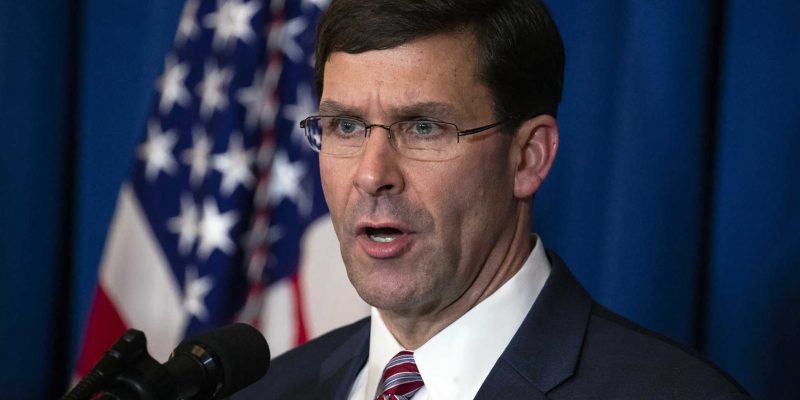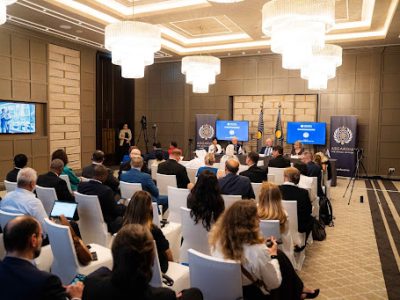The disparity between the defense secretary and President Trump added another twist to an ever-evolving explanation for a strike on an Iranian general that led to the brink of war.
WASHINGTON — They had to kill him because he was planning an “imminent” attack. But how imminent they could not say. Where they could not say. When they could not say. And really, it was more about what he had already done. Or actually it was to stop him from hitting an American embassy. Or four embassies. Or not.
For 10 days, President Trump and his team have struggled to describe the reasoning behind the decision to launch a drone strike against Maj. Gen. Qassim Suleimani, the commander of Iran’s elite security forces, propelling the two nations to the brink of war. Officials agree they had intelligence indicating danger, but the public explanations have shifted by the day and sometimes by the hour.
On Sunday came the latest twist. Defense Secretary Mark T. Esper said he was never shown any specific piece of evidence that Iran was planning an attack on four American embassies, as Mr. Trump had claimed just two days earlier.
“I didn’t see one with regard to four embassies,” Mr. Esper said on CBS’s “Face the Nation.” But he added: “I share the president’s view that probably — my expectation was they were going to go after our embassies. The embassies are the most prominent display of American presence in a country.”
Must Read:- World reacts on after Iran fires missiles at US targets in Iraq
The sharp disparity between the president and his defense secretary only added to the public debate over the Jan. 3 strike that killed Iran’s most important general and whether there was sufficient justification for an operation that escalated tensions with Iran, aggravated relations with European allies and prompted Iraq to threaten to expel United States forces. General Suleimani was deemed responsible for killing hundreds of American soldiers in the Iraq war more than a decade ago, but it was not clear whether he had specific plans for a mass-casualty attack in the near future.
While agreeing that General Suleimani was generally a threat, Democrats in Congress, as well as some Republicans, have said the administration has not provided evidence even in classified briefings to back up the claim of an “imminent” attack, nor has it mentioned that four embassies were targeted. Even some Pentagon officials have said privately that they were unaware of any intelligence suggesting that a large-scale attack was in the offing.
But senior government officials with the best access to intelligence have insisted there was ample cause for concern even if it has not been communicated clearly to the public. Gina Haspel, the director of the C.I.A., and Gen. Mark A. Milley, the chairman of the Joint Chiefs of Staff — who were both appointed by Mr. Trump but are career officials without a political history — have said privately and forcefully that the intelligence was compelling and that they were convinced a major attack was coming.
The challenge for the Trump administration is persuading the public, which has been skeptical about the intelligence used to justify military action since President George W. Bush invaded Iraq in 2003 based on what turned out to be inaccurate intelligence indicating that Saddam Hussein had weapons of mass destruction.
Mr. Trump himself has made clear in other circumstances that he does not trust the intelligence agencies that he is now citing to justify his decision to eliminate General Suleimani. Moreover, given his long history of falsehoods and distortions, Mr. Trump has his own credibility issues that further cloud the picture. All of which means the administration’s failure to provide a consistent explanation has sown doubts and exposed it to criticism.
“If indeed the strike was taken to disrupt an imminent threat to U.S. persons — and that picture seems to be getting murkier by the minute — the case should be made to Congress and to the public, consistent with national security,” said Lisa Monaco, a former senior F.B.I. official and homeland security adviser to President Barack Obama. “Failure to do so hurts our credibility and deterrence going forward.”
Intelligence officials, who spoke on the condition of anonymity to describe sensitive data collection, have said there was no single definitive piece of information about a coming attack. Instead, C.I.A. officers described a “mosaic effect,” multiple scraps of information that came together indicating that General Suleimani was organizing proxy forces around the region, including in Lebanon, Yemen, and Iraq, to attack American embassies and bases.
Several officials said they did not have enough concrete information to describe such a threat as “imminent,” despite the administration’s assertion, but they did see a worrying pattern. A State Department official has privately said it was a mistake for Secretary of State Mike Pompeo to use the word “imminent” because it suggested a level of specificity that was not borne out by the intelligence.
“I have not seen the intelligence, just to be clear, but it is sometimes possible for the reporting of planned attacks to be very compelling even without specificity of time, target or method,” said John E. McLaughlin, a former acting C.I.A. director. “In a sense, that is the story of 9/11. Our reporting gave us high confidence that a big attack was coming — and we so warned — but we were unable to nail down key details.”
Mr. McLaughlin said that the administration may well have had intelligence adequate to compel action, but that it was a separate question whether killing General Suleimani was the most effective response, as opposed to hardening targets or choosing a less provocative option.
John B. Bellinger III, who was the top lawyer for the National Security Council and later the State Department under Mr. Bush, said the president would have the legal authority to strike under the Constitution whether or not there was fear of an imminent attack.
But under the United Nations Charter, the United States cannot use force in another country without its consent or the authority of the Security Council except in response to an armed attack or a threat of an imminent armed attack. “So under international law, the attack on Suleimani would not have been lawful unless he presented an imminent threat,” Mr. Bellinger said.
Claims that an imminent attack could take “hundreds of American lives,” as Mr. Pompeo put it right after the drone strike, have also generated doubts because no attack in the Middle East over the past two decades, even at the height of the Iraq war, has ever resulted in so many American casualties at once in part because embassies and bases have become so fortified.
The contrast in descriptions of what the administration knew and what it did not come in quick succession on a single Fox News show last week.
On Thursday night, Mr. Pompeo, while sticking by his description of an “imminent” attack, acknowledged that the information was not concrete. “We don’t know precisely when and we don’t know precisely where, but it was real,” he told the host, Laura Ingraham.
The next day, in a separate interview, Mr. Trump told Ms. Ingraham that in fact, he did know where. “I can reveal that I believe it probably would’ve been four embassies,” he said.
That left administration officials like Mr. Esper in an awkward position when they hit the talk show circuit on Sunday. While the defense secretary revealed on CBS that he had not seen intelligence indicating four embassies were targeted, he sounded more supportive of Mr. Trump’s claim on CNN’s “State of the Union.”
“What the president said in regard to the four embassies is what I believe as well,” he said, seeming to make a distinction between belief and specific intelligence. “And he said he believed that they probably, that they could have been targeting the embassies in the region.”
Appearing on “Fox News Sunday,” Robert O’Brien, the president’s national security adviser, played down Mr. Trump’s claim of specific, imminent threats to four American embassies in the region.
“Look, it’s always difficult, even with the exquisite intelligence that we have, to know exactly what the targets are,” Mr. O’Brien said. “We knew there were threats to American facilities, now whether they were bases, embassies — you know it’s always hard until the attack happens.”
“But,” he added, “we had very strong intelligence.”
Senator Mike Lee of Utah, one of the administration’s most outspoken Republican critics after the strike, said on CNN that he worried about the quality of the information that national security officials were sharing with Congress and had not “been able to yet ascertain specific details of the imminence of the attack.”
“I believe that the briefers and the president believed that they had a basis for concluding that there was an imminent attack, I don’t doubt that, but it is frustrating to be told that and not get the details behind it,” he said.
Speaker Nancy Pelosi struck a similar tone, telling ABC’s “This Week” that “I don’t think the administration has been straight with the Congress of the United States” about the reasons for killing General Suleimani.
On “Face the Nation,” Representative Adam B. Schiff, Democrat of California and chairman of the House Intelligence Committee, accused the president and his top aides of “fudging” the intelligence.
“Frankly, I think what they are doing is overstating and exaggerating what the intelligence shows,” Mr. Schiff said. Officials briefing the so-called Gang of Eight top congressional leaders never said that four embassies were targeted, he added. “In the view of the briefers, there was plotting, there was an effort to escalate being planned, but they didn’t have specificity.”
















Comments